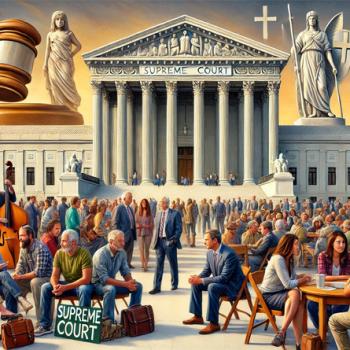Tribulation Force, pp. 65-67
We left off with Bruce Barnes explaining that the four horsemen of the apocalypse must be taken literally.
We've already seen how, for Bruce as for Tim LaHaye, this word "literally" is not meant literally. For them it means something more like "my way." It's opposite would be "mere symbolism," which means for them, roughly, "any meaning other than the meaning imposed on a passage by reading it my way."
Neither Bruce nor LaHaye would admit that this is what they're saying. Both would insist that what they mean is, in Bruce's phrase, "to take Scripture at its word." They suggest that this means sticking to the clearest, most obvious meaning of the words of a text by rejecting all symbolism, imagery and metaphor.
Most readers, writers and users of language — which is to say, most humans — will find such an approach contradictory. What is left of language if we remove metaphor and symbol? And by what right or logic can we apply this external standard to a text that makes no such claim for itself?
We've come to a fork in the road here (at least three layers of metaphor right there — take those away and you'd never be able to understand the obvious meaning of this sentence), but we'll try to steer away from a diverting diversion into the meaning of language itself and stick to the main trail. Rather than getting sidetracked into a discussion of why the proposed "literal" hermeneutic is necessarily inconsistent, arbitrary, unprincipled and misleading, let's just watch it in action and witness how it falls apart.
We can start with Bruce's four horsemen. Because if we read the main text for his sermon "literally," there would seem to be five of them:
I watched as the Lamb opened the first of the seven seals. Then I heard one of the four living creatures say in a voice like thunder, "Come!" I looked, and there before me was a white horse! Its rider held a bow, and he was given a crown, and he rode out as a conqueror bent on conquest.
When the Lamb opened the second seal, I heard the second living creature say, "Come!" Then another horse came out, a fiery red one. Its rider was given power to take peace from the earth and to make men slay each other. To him was given a large sword.
When the Lamb opened the third seal, I heard the third living creature say, "Come!" I looked, and there before me was a black horse! Its rider was holding a pair of scales in his hand. Then I heard what sounded like a voice among the four living creatures, saying, "A quart of wheat for a day's wages, and three quarts of barley for a day's wages, and do not damage the oil and the wine!"
When the Lamb opened the fourth seal, I heard the voice of the fourth living creature say, "Come!" I looked, and there before me was a pale horse! Its rider was named Death, and Hades was following close behind him. They were given power over a fourth of the earth to kill by sword, famine and plague, and by the wild beasts of the earth.
Where did all those "wild beasts of the earth" come from just now? And are these "literal" wild beasts, or is it like the Beast we encounter in later chapters? And why does poor Hades not get his own horse? That seems like quite an indignity for the brother of almighty Zeus himself — even worse than having Pluto relegated to sub-planetary status.
This sudden appearance of a member of the pagan Greek pantheon is quite a hurdle for a "literal" approach here. If Hades is literally real, then what of Poseidon, Persephone, Cronus and Rhea and the rest of his family? If we're going to interpret the sixth chapter of Revelation "literally," then it seems we may need to do the same for Bullfinch as well.
But maybe we could make an exception here, just this once, and regard this reference to Hades as, you know, that thing the liberals do with the metaphor and the symbolism and what not. That might also help with the other nearly a dozen references to Hades throughout the New Testament. Most of those passages seem to use the god of the underworld's name as the Greek translation of the Hebrew term sheol, which means, roughly, "the grave." So maybe we can do that here and come to a literal-ish reading of Rev. 6 that says this fifth horseman-without-a-horse is "the grave."
Which grave? Come on, you know, not a specific grave, but The Grave in general, in the abstract, as a symb …, I mean a metaph …
Oh crud. This strict literalism isn't easy, is it?
Even poor Bruce is forced to admit that this passage defies (refutes, destroys, demolishes and salts the earth of …) his alleged "literal" hermeneutic. He starts out by warning his congregation that they must never treat such passages as "symbolic" and he mocks those who would see its description as "mere symbolism." But on the very next page he veers away from his promised "literal" approach and sketches out what he believes this passage signifies.
That's his word, "signifies." It took him only four paragraphs to go from talking like a backwoods fundamentalist to talking like an assistant professor of semiotics.
"I don't have time to get into the second and third and fourth horsemen this morning," Bruce said, "except to say that the rider on the red horse signifies war, the black horse famine, and the pale horse death."
And a bit later, Bruce isn't just backpedaling, he's in full-speed retreat:
"Let me clarify," Bruce was saying, "that I don't believe it is God's intent to convey individual personality through the imagery of these horsemen, but rather world conditions. They don't all refer to specific people because, for instance, the fourth horseman is called Death."
The authors might be able to salvage a few scraps of literalism later on in this series of books by having three quarts of barley literally cost a day's wages, but that's small consolation for the utter failure of their approach to deal with the first four seals of judgment.
Of course that doesn't stop LaHaye and Jenkins from making the Triumph of Literalism a major theme of these chapters, trumpeted on every page of this section. Chastened consistency isn't really their strong point.
The authors turn away from this suffocating theme of the awesomeness of literalism only to address, occasionally, the other main theme of this section: The awesomeness of Bruce's preaching.
As Bruce plunged ahead, Buck was struck that the last speaker he had heard who was so captivating was Nicolae Carpathia. But Carpathia's impression had been choreographed, manipulated. Bruce wasn't trying to impress anyone with anything but the truth of the Word of God.
Nope, nothing choreographed or desperate to impress about Bruce at all. Except for maybe his carefully untucked shirt and his drawing attention to it by extravagantly apologizing for longer than it would have taken him to tuck it in. And maybe his overwrought dramatic pauses and his sweatin' in the Spirit handkerchief routine. Bruce isn't any less choreographed than Nicolae, his choreography is just clumsier, more transparent, and not as well executed.
The lavish praise heaped on Bruce's preaching illustrates the importance of spontaneity in evangelical homiletics. Or at least of the appearance of spontaneity. This is a manifestation of the anti-intellectual virus infecting
the tradition (again, I really can't recommend Mark No
ll's The Scandal of the Evangelical Mind often or strongly enough). Preparation and crafted rhetoric are taken as signs of suspicious book-larnin', whereas spontaneity is taken as a sign of, as L&J would say, passionate sincerity. Bruce's rumpled costume and pose of urgency don't really come across as spontaneous or sincere, but I suppose his desire to appear sincere is sincere enough, so that will have to do.
Bruce's emphasis in his sermon is on the first rider from Rev. 6, the "conqueror bent on conquest," regarded by premillennial dispensationalists as their Antichrist or, in these books, Nicolae. Yet Bruce remains weirdly coy about telling his congregation what he already knows and believes about the Antichrist. He refuses to mention Nicolae by name, choosing instead just to drop hints — some condescendingly obvious — about who the Antichrist might be. This tip-toeing around his subject doesn't help his attempts to appear urgently sincere. It's hard to come across as sincere when you're steadfastly refusing to tell your listeners what it is you really believe.
Would [Bruce] tell this body that he believed he knew who the Antichrist was? In a way Buck hoped he would. But that might be considered slander, to publicly finger someone as the archenemy of almighty God.
Slander? For a journalist, Buck doesn't have much of a grasp on libel law. He apparently never looked at the last two thirds of that stylebook on his desk at Global Weekly.
First of all, it isn't slander if what is said is true, and in the context of this book, saying "Nicolae Carpathia is the Antichrist," is true. You'd think Bruce would be eager to say so and that he'd welcome a lawsuit for slander — an opportunity to state his case, under oath and for the record before the eyes of the world, explaining what the Antichrist is, what he is going to do, and who has stepped into that role. He could be just like St. Paul before Felix, Festus and Agrippa. (Well, except that Paul was a Christian, a follower of Christ, and Bruce is, instead, an anti-Antichristian, first and foremost an opponent of the Antichrist. But other than that it would be just like chapters 24-26 of the book of Acts.)
Nicolae is also a public figure and therefore anything awful that one chooses to say about him would be protected speech under the First Amendment. Granted, the First Amendment was part of the old regime, and Nicolae's new OWG might not recognize it, but Bruce couldn't know that, since even though at this point in our story all formerly sovereign nations (except Israel) have been placed under the authority of Nicolae's 10 princes, almost nobody realizes that happened since Nicolae and Steve still haven't gotten around to rescheduling the press conference officially announcing the New World Order.
But anyway, when has a pastor even been sued for slander on the basis of a sermon naming someone as the Antichrist? PMD preachers have been doing exactly that for more than a century and I've never heard of any of them getting sued because of it. Sure, the fundraising letters of groups like the Alliance Defense Fund and the Rutherford Institute are filled with urban legends about preachers getting accused of slander against sinners, but everyone writing and reading those pleas for money knows full well they're just a bit of self-deluding nonsense repeated to help us feel persecuted and therefore better than our kitten-burning neighbors.
That same narcissistic need for a feeling of superiority is also, of course, the real reason Bruce doesn't let the congregation know what he knows about Nicolae. Doing so would make the heroes of the executive committee of the ninth inner circle of the Tribulation Force feel less special. You can't be exclusive if you never exclude.
So instead Bruce simply drops lots of hints:
Or would Bruce simple tell what the Bible said and let the people come to their own conclusions? The news was already full of rumors about some impending agreement between Carpathia — or at least the Carpathia-led U.N. — and Israel. If Bruce predicted a pact that was borne out over the next few days, who could doubt him?
Buck's logic here is backwards. The fact that the news is "already full of rumors about some impending agreement" would make Bruce's prediction of such a deal less impressive, not more so.
But enough about Buck, what about Captain Steele? Is Rayford just as fascinated by all of this?
Rayford was more than fascinated. He was stunned. In many ways, Bruce was reading his mind.
Anyone want to take a crack at a "literal" reading of that last sentence?
Not long ago he would have scoffed at such teaching, at such a literal take on so clearly a poetic and metaphoric passage. …
OK, Theme 1, check. How about Theme 2?
… But what Bruce said made sense. … This wasn't preaching as much as teaching, and Bruce's passion, the immersion of his soul into the subject, made it all the more compelling.
Yep, Theme 2, check.
[Bruce] sped toward his point and his conclusion by reading from Revelation 6:1-2. …
Bruce dramatically moved back a step and began clearing off the small lectern. "Don't worry," he said. "I'm not finished."
But … but you just said he was speeding toward his conclusion. And why is he clearing off the lectern? This is starting to remind me of that Lyle Lovett song.
To Rayford's surprise, people began to applaud. Bruce said, "Are you clapping because you want me to finish, or because you want me to go on all afternoon?"
And the people clapped all the more. Rayford wondered what was happening. He applauded too, and Chloe and Buck were doing the same. They were drinking this in, and they wanted more and more.
Hah! See? Betcha that never happens in your fancy schmancy liberal churches with your metaphors and symbolism and your obsession with what the text means instead of what it simply says. This literalist triumphalism builds to a crescendo here at the end of Chapter 3:
Clearly Bruce had been in tune with what God was showing him. He had said over and over that this was not new truth, that the commentaries he cited were decades old and that the doctrine of the end times was much, much older than that. …
Why, the Scofield Reference Bible dates back to the days of the early church, all the way back to 1909!
But those who had relegated this kind of teaching to the literalists, the fundamentalists, the closed-minded evangelicals, had been left behind. All of a sudden it was all right to take Scripture at it's word!
Oh for the love of …
In my most cynical moments, I sometimes think that the whole structure of Christian theology seems like an elaborate ruse to escape the unambiguous obligations set forth in the
Sermon on the Mount. The bluntest and crudest dismissal of that passage comes from these people — from Tim LaHaye and Jerry Jenkins and their premillennial dispensationalist cohorts. All that stuff about helping the poor and turning the other cheek and not worshipping Mammon and overcoming evil with good — all of that, they say, doesn't apply to us. That's for another "dispensation" — for the future (literal) millennial kingdom. Here in our dispensation, they say, we're free to ignore all of that. And then they defend this outrageous claim by inventing a massive, convoluted, text-shredding hermeneutic that hop-skotches arbitrarily between unrelated passages, misreads the few passages it pays any attention to, and disregards the rest.
And these awful, illiterate people, these dissembling dismissers of Scripture, then have the chutzpah to claim that they, and they alone, "take Scripture at it's word."
I find that a bit … irritating.
Anyway:
Bruce stood before the bare lectern now with only his Bible in his hand. …
Nothing choreographed here at all. …
"I want to tell you now what I believe the Bible is saying about the rider of the white horse, the first horseman of the Apocalypse. I will not give my opinion. I will now draw any conclusion. I will simply leave it to God to help you draw any parallels that need to be drawn. I will tell you only this in advance: This millenniums-old account reads as fresh to me as tomorrow's newspaper."
So we reach the end of Chapter 3, but we're still far from the end of Bruce's sermon. It hardly seems to me that he's "speeding toward" his conclusion. And if he's speeding toward his point, he's also made it clear that he doesn't intend to actually state it.
















